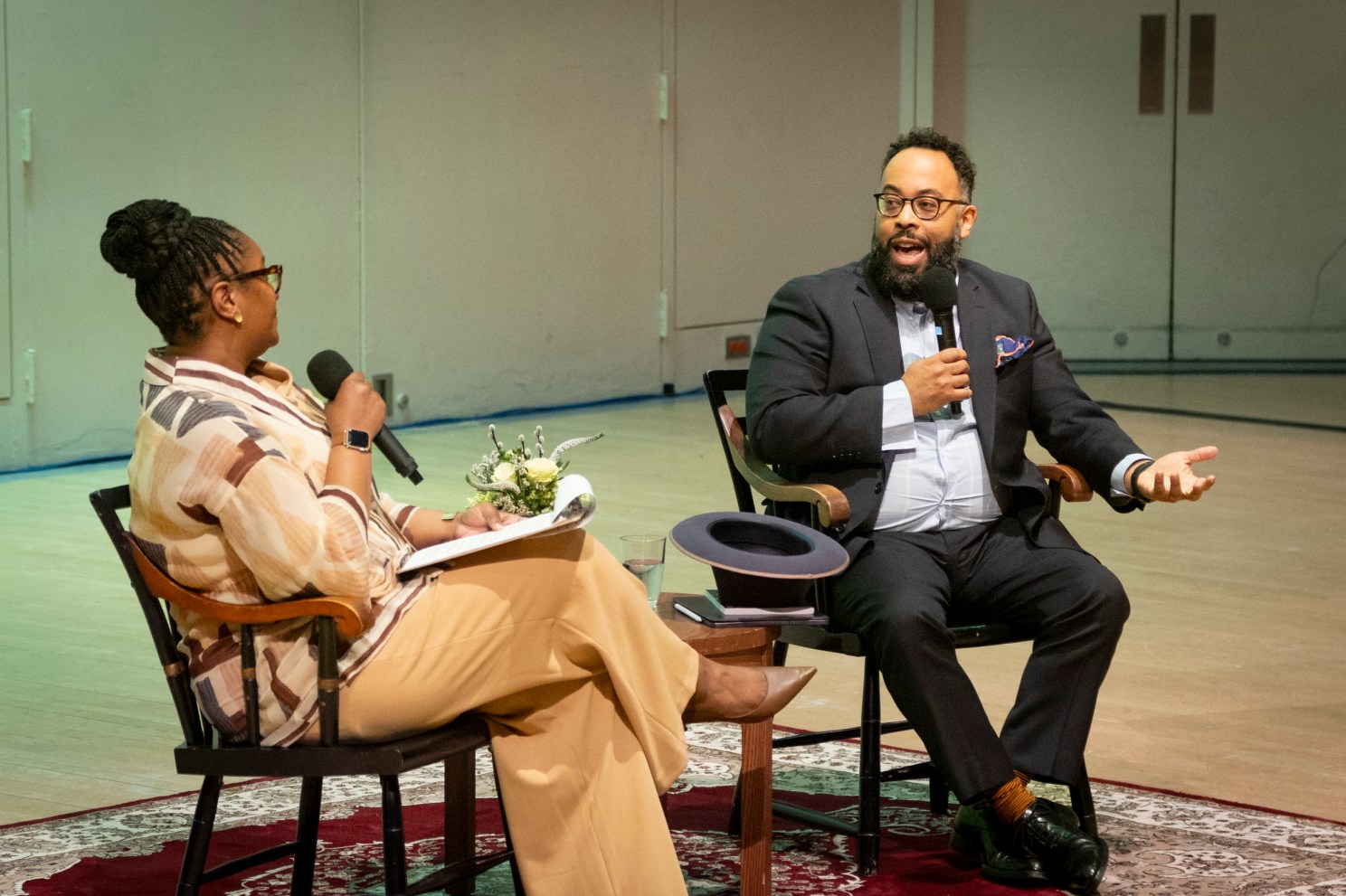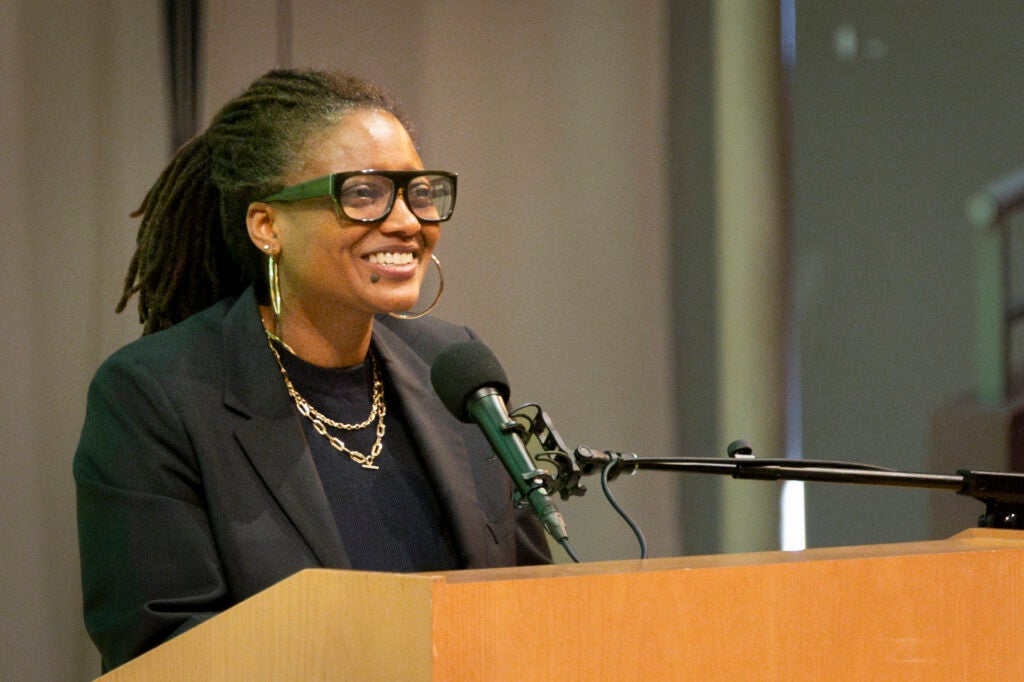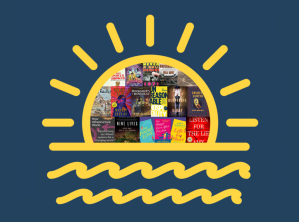Acclaimed poet receives Arts Medal

Kevin Young with Brenda Tindal at the Lowell Lecture Hall.
Photos by Niles Singer/Harvard Staff Photographer
Kevin Young ’92 reflects on what took root at Harvard and how it’s grown
When Kevin Young ’92 came to Harvard as an undergraduate, he dreamed of becoming a poet. He wanted to write about Louisiana and his family, something he had yet to see in poetry collections.
Young studied under celebrated poets Seamus Heaney and Lucie Brock-Broido, joined the Dark Room Collective, a Boston-based community of African American writers, and threw himself into poetry.
“I’ve never wanted to do anything else,” said Young as he reminisced about his time at Harvard Wednesday to an audience gathered at Lowell Lecture Hall to celebrate him as he was awarded the 2024 Harvard Arts Medal.
The Harvard Arts Medal recognizes a Harvard or Radcliffe alum or faculty member who has demonstrated excellence and achievement in the arts.
Young is an acclaimed poet, an editor, an essayist, a professor, and a library curator. At Emory University in Atlanta, where he taught, he was the curator of the 75,000-volume Raymond Danowski Poetry Library, one of the world’s largest and most significant collections of verse. He also served as director of the Schomburg Center for Research in Black Culture at the New York Public Library, the world’s oldest and largest Black archive. A winner of a Guggenheim Fellowship, Young is currently the Andrew W. Mellon Director of the Smithsonian’s National Museum of African American History and Culture.
For Young, all his intellectual endeavors are closely tied, and they all took root during his time at Harvard, where he took classes in poetry, learned letterpress printing, handled archival material, and took inspiration from his professors and peers.
“All these roles are expressions of me, but also part of the work I do,” said Young during a conversation with Brenda Tindal, chief campus curator for the Faculty of Arts and Sciences.
“Once I started to think about the people I tried to write about in my poems, people I hadn’t seen in poetry, my family and Louisiana, for one, were also people who weren’t always in the archives. And the two things seemed similar. Writing poetry can be an act of recovery. It is certainly an act of remembrance. And for me, that’s what archives were …”
Writing poems and curating archives are also connected to directing a museum, said Young. “We definitely show things at the museum that we want you to understand better and help contextualize, but we don’t put our finger too hard on that. We have objects like Harriet Tubman’s shawl and Emmet Till’s casket. How can you not have all the feelings in seeing these objects and encountering them? The important thing is that encounter, and for me that’s in poetry, that’s in archives, that’s in museums.”
Presented by the Office for the Arts at Harvard in partnership with the Department of English, the ceremony kicked off Arts First (April 24-28), the University’s annual festival showcasing the creativity of students, faculty, staff and University affiliates in the arts.
Harvard University interim President Alan Garber awarded the medal to Young by welcoming him to join the list of previous honorees, who include Yo-Yo Ma ’76, Frank Gehry, G.S.D. ’57, Ar.D. ’00, Ruben Blades, LL.M. ’85, and Colson Whitehead ’91, among many others. The first Harvard Arts Medal was awarded in 1995.
“From the crowded field came individuals of outstanding achievement in the arts; they created worlds of possibility and potential with art, in architecture, and with music, poetry, and writing,” said Garber. “Today his singular talent joins their revered number. If we all share what Kevin Young has called, and I quote him, ‘an American desire for more,’ then our medalist more than delivers. He is an acclaimed poet and essayist. He is an editor. He is a museum director. He is thrillingly prolific to all of our benefit.”
Young has published 15 books of poetry and prose, most recently “Stones,” shortlisted for the T.S. Eliot Prize, and “Blue Laws: Selected & Uncollected Poems 1995-2015,” longlisted for the National Book Award. His poetry collection “Jelly Roll: A Blues” was a finalist for the National Book Award in 2003. The poetry editor at The New Yorker since 2017, where he hosts the Poetry Podcast, Young is the editor of nine poetry volumes, including the highly praised anthology “African American Poetry: 250 Years of Struggle & Song.”
Describing herself as a friend and fan of Young, Tracy K. Smith ’94, professor of English and of African and African American studies and the Susan S. and Kenneth L. Wallach Professor at the Harvard Radcliffe Institute, offered remarks during the ceremony. She spoke of her long friendship with Young — they met as undergrads at Harvard — and her admiration for his masterful craft as a poet of the African American experience in the U.S.
Smith spoke about “Saying Grace,” a poem included in Young’s first poetry book, “Most Way Home,” published in 1995. Young’s senior thesis was the basis for this book, which covered oral histories of the South.

“The miracle here is that a grounded, gritty, even a grisly memory with the proper attention floods the reader with a sense of longing, reunion, and astonishment,” said Smith. “Young has published 10 books of poems and several works of highly researched nonfiction since the release of ‘Most Way Home,’ but I begin at that beginning because early poems like this one is where I met Kevin Young as a poet and where, here at Harvard, I first began to learn from the example of his dedication.”
Smith recalled the time when Young printed a letterpress broadside of his poem “Reward,” which was part of his then-thesis in progress and eventually made it into “Most Way Home.” “Even then he took himself seriously as an artist,” said Smith. “I remember the reading Kevin gave in Adams House in the spring of 1992 and feeling my heart catch in my throat when his voice rose steady, already in his now-familiar cadence, and with an authority I thought was the domain of only older folk or professors and famous poets.”
As part of the ceremony, undergraduate poets Taylor Fang ’25, Mia Word ’24, and Isabella Cho ’24 asked Young questions about his writing process, finding his voice, and the role of poetry in understanding and talking about history.
“I’m really interested in how history shapes us and how history is encountered by ordinary folks,” said Young. “To me, one of the great things about poetry is that it makes the ordinary extraordinary, and it makes the extraordinary an ordinary occurrence … I think a good museum does something of that, too. You see yourself in it and you see each other.”
Of his writing process, Young said it’s important to try to capture feelings and sensations, leaving the understanding for later. He advised young poets to wrestle with language and form and make them their own, and be open to revise drafts because it is part of the practice.
“It’s not always fun revising, but it also is part of getting it right,” said Young. “It’s not always going to feel 100 percent, and in a way, that’s part of the yearning and searching. … That’s maybe why you write 25 books because you’re trying to get it right.”
Young ended the ceremony with a reading of the poem “Hereafter,” and he called on the audience to open their hearts and minds to the arts.
“Art welcomes you, and moreover awaits you,” said Young. “Start something. Make something. Dream alone or with others. Sing. Come on in.”




